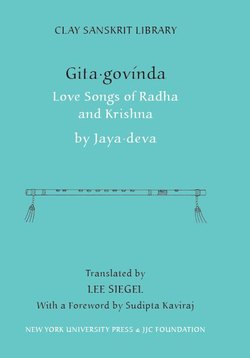Читать книгу Gita Govinda - Jayadeva - Страница 19
На сайте Литреса книга снята с продажи.
Оглавлениеof those rasikas who, while appreciating erotic poetry, also “relish recollections of [the deeds of] Lord Krishna.” Smarana, the word designating that recollection, has various connotations. As codified in the rhetorical and dramaturgical textbooks, and as employed in the literature of love, it is a diagnostic term for a particular symptom of love—the passionate longing of the lover for the beloved in separation. Jaya·deva uses it as such: “I remember Krishna dancing,” Radha sings again and again as the refrain to Song v. But smarana is also a religious term in the established vocabulary of the devotional Krishna-bhakti movement: in the “Bhagavad Gita” Krishna reveals that his favor is won by recollection of him; in the Visnu Purana that recollection eradicates impurity and evil; and in the Bhagavata Purana it affords liberation from this world and entry into the highest tier of Vishnu-Krishna’s heavenly abode. And Jaya·deva uses the word in this way: in conclusion to Radha’s song of remembering Krishna’s dance, her recollections symptomatic of erotic longing, Jaya·deva adds his intent that her song inspire virtuous, religiously-minded, people to recollection, to smarana as pious veneration of Krishna. And in the last line of the last song of the “Gita·govinda,” the poet proclaims that recollection to be the nectar of immortality that dispels the sufferings and iniquities of this degenerate age.
In dedicating the work to an audience that relishes both the pleasures of erotic love and the joys of recollecting Lord Krishna, the introductory stanza establishes a dialectical juxtaposition which informs the text as a whole. It is a sensual courtly poem about the illicit love affair of a lusty cowherd ________
